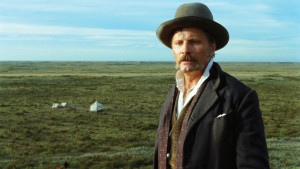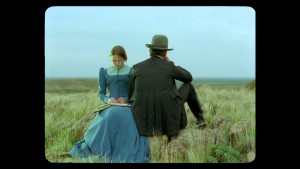 Review: One Night Only
Review: One Night Only
Jauja | Lisandro Alonso | Argentina, Denmark | 2014 | 106 min
UW Cinematheque, 4070 Vilas Hall, Saturday, March 7, 7:00pm»
Viggo Mortensen stars in this intriguing period piece set in 1882 Patagonia. The cinematography and visual storytelling make it a worthwhile experience, if you can forgive its lapses into art cinema clichés.
There’s a lot going on at the UW Cinematheque this weekend, with the start of three film series: the Masterpieces of Polish Cinema series will play the next several Fridays, the Universal ’71 series plays the next several Sundays at the Chazen, and a New Argentine Cinema series (co-sponsored by the Department of Latin American, Caribbean, and Iberian Studies) plays through this weekend. To the Cinematheque suggestion box: Please consider staggering the starting weekends for series to make it possible to cover them in any depth in the local media. But being overwhelmed is a good problem to have, especially since it should get us primed for the Wisconsin Film Festival next month.
The LACIS New Argentine Cinema series kicks off with Lisandro Alonso’s Jauja, which received the FIPRESCI Prize (International Federation of Film Critics) at the Cannes Film Festival last year. It is an Argentine-Danish co-production, thus it was able to land an internationally known star, Viggo Mortensen, for the lead. Jauja tells the story of a Danish engineer Gunnar Dinesen (Mortensen), who in 1882 has travelled to the Patagonia region with his daughter Ingeborg (Viilbjork Agger Malling) to take charge of a surveying project to bring civilization to the wilderness. In addition to battling the elements of nature, Dinesen must also deal with the consequences of bringing his daughter into an environment where the men do not see many women.
The narrative is relatively minimal, with the dialogue hinting of a larger world outside of the empty landscapes contained in almost every shot. Somewhere out there a soldier has gone mad and gone rogue, not unlike Kurtz in Apocolypse Now, adding to the inherent danger of the environment. Despite the dangers, Ingeborg runs off with a soldier, but it is less certain if she is in love or just wants someone to follow her. After this plot point much of the film concerns Dinesen’s search for Igneborg in the Patagonian wilderness.
 Style trumps narrative depth here, but the visual storytelling does have its own distinct and appealing qualities. The pace allows you to take in every gorgeous shot. Like Ida and parts of The Grand Budapest Hotel, the film is shot in academy ratio (4:3) which gives a cramped, claustrophobic feeling even to the landscape shots. Saturated colors give the images a vibrant, crisp immediacy. While cut with traditional analytical editing, the scenes still feel like as series of tableaux. And the mannered acting style makes it feel like the actors have turned the pitch slightly down—not quite slow motion, but always contemplative and deliberate in their speech and actions. Mortensen, to his credit, allows himself to be absorbed into this style rather than dominating it with his star power.
Style trumps narrative depth here, but the visual storytelling does have its own distinct and appealing qualities. The pace allows you to take in every gorgeous shot. Like Ida and parts of The Grand Budapest Hotel, the film is shot in academy ratio (4:3) which gives a cramped, claustrophobic feeling even to the landscape shots. Saturated colors give the images a vibrant, crisp immediacy. While cut with traditional analytical editing, the scenes still feel like as series of tableaux. And the mannered acting style makes it feel like the actors have turned the pitch slightly down—not quite slow motion, but always contemplative and deliberate in their speech and actions. Mortensen, to his credit, allows himself to be absorbed into this style rather than dominating it with his star power.
I was often reminded of Kelly Reichardt’s western Meek’s Cutoff, because within the barren landscapes the only way to mark the time period is through costumes, props, and performance. Like Cutoff, at times Jauja feels like people playing dress-up and pretend. But this is less of a problem with Jauja once Dinesen sets out on his quest, because the quest and the landscapes take center stage.
Near the end, the film twice wonders into art cinema narration territory. The first turn is tolerable, and somewhat intriguing. The second turn is cliché ridden and almost unforgivable. First, a stray dog leads Dinesen to a mysterious old woman in a cave. The ambiguous cues in their conversation opens up many interesting narrative possibilities. Explicitly stating the second turn would be too much of a spoiler, I suppose, but the clichés include someone “waking up” and the dog returning (or does it???). Yes, this second turn is also rich with ambiguity and opportunities for interpretation. But none of these possible interpretations are at all interesting. It is far more likely that you will roll your eyes and shake your head.
I won’t go so far as to say that the ending ruins the film, but it comes pretty darn close. Clearly the FIPRESCI critics disagree with me, and perhaps you will as well. There’s more than enough strong material here to make Jauja worth your while on Saturday night, and the cinematography should make it a much more vibrant experience on the big screen. If you do end up liking the ending more than I did, please feel free to tell me in the comments section below.
Why only one nite? Do you have a film print? Where does the film go next (MN/IA)? I want to see this film any suggestions on how i have s conflict with tomorrow night … ie. work and distance
Hello,
The UW Cinematheque programs one-night screenings of films on the weekends during the academic year. I couldn’t find an official website for the film, but you could try asking the Cinematheque programmers for contact information for the distributors: info@cinema.wisc.edu (keep in mind that they are currently working on the Wisconsin Film Festival and it is crunch time for them; their program guide comes out on March 11, so it might take them a while to get back to you.). For more on the UW Cinematheque, go to http://cinema.wisc.edu/
Meanwhile, you might find GoWatchIt.com a helpful resource. It can notify you when titles become available on DVD, Blu-Ray, or streaming resources. You can click the GoWatchIt box at the end of the review, or go to http://gowatchit.com/movies/jauja-269245
I hope that helps. Thanks for checking out the Madison Film Forum!
Jim Kreul
Madison Film Forum
info@madfilm.org